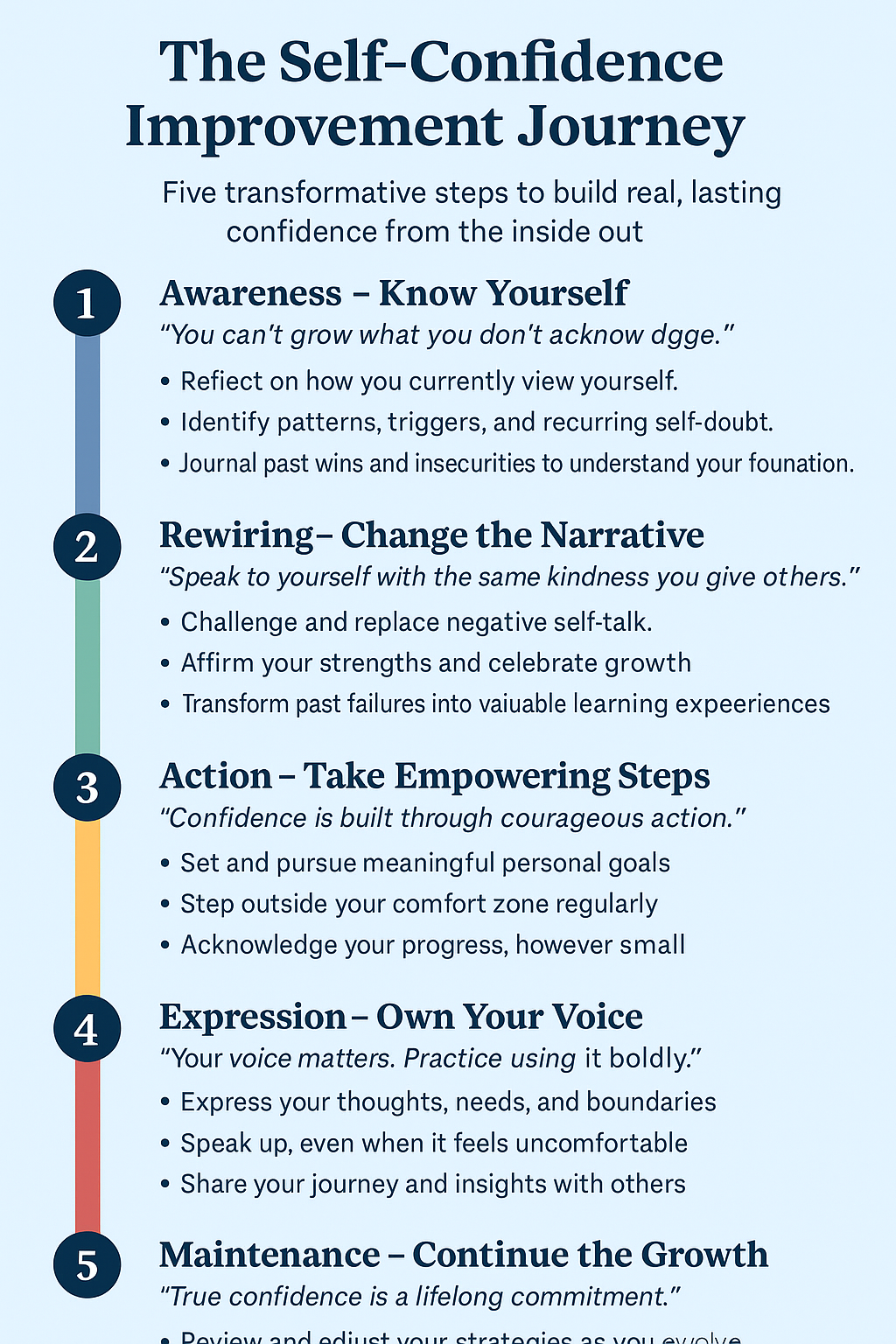Today, we want to talk about seeking support for self confidence boosting. We often admire confidence in men — the way they carry themselves, speak up, and stand tall. But what we rarely talk about is what it takes to build that confidence. Behind true self-assurance is often a courageous choice: the decision to seek support when it’s needed most

Self-esteem is the overall opinion we have of ourselves. It is influenced by a variety of factors, including our life experiences, our relationships, and our thoughts and beliefs. Low self-esteem can have a negative impact on our mental and emotional well-being, as well as our relationships and careers.
If you are struggling with low self-esteem, it is important to understand How to seek support for self-confidence. Consulting with a mental health professional or counselor can be a helpful way to address your self-esteem issues and develop a more positive and realistic self-image.
💡 Key Insight: Seeking therapy makes you 37% more attractive according to 2025 Psychology Today study
The Power of Seeking Support
1. Courage and Self-Awareness:
Seeking support is a testament to courage and self-awareness. It takes a strong person to acknowledge their challenges and take proactive steps to address them. This self-awareness is inherently attractive.
2. Emotional Intelligence:
Engaging with mental health professionals or counselors demonstrates emotional intelligence. A man who values his mental and emotional well-being and seeks guidance to improve is not only more confident but also more empathetic and understanding, which are qualities women highly admire.
3. Vulnerability:
Seeking support is an act of vulnerability, and vulnerability fosters deeper connections. It’s about being open about your imperfections and your willingness to work on them, creating trust and intimacy in relationships.
Benefits of seeking support for self-confidence
There are many benefits to seeking support for self-esteem issues, including:
- Identifying the root causes of low self-esteem. Mental health professionals can help you to identify the underlying thoughts, beliefs, and experiences that are contributing to your low self-esteem.
- Developing coping mechanisms. Mental health professionals can teach you a variety of coping mechanisms for dealing with negative thoughts and emotions.
- Building self-confidence. Mental health professionals can help you to develop your self-confidence and learn to appreciate your strengths.
- Improving relationships. Mental health professionals can help you to improve your relationships with others by teaching you how to communicate effectively and build healthy boundaries.
Where to Find Support for Self-confidence
When choosing a mental health professional or counselor, it is important to find someone who you feel comfortable with and who specializes in self-esteem issues.
You can ask for recommendations from your doctor, friends, or family members. You can also search for mental health professionals in your area online.
What to Expect in Therapy
Therapy can be a helpful way to address self-esteem issues, but it is important to be patient and persistent. It takes time to change negative thought patterns and develop a more positive self-image.
In therapy, you will work with your mental health professional to develop a personalized treatment plan. Your treatment plan may include a variety of interventions, such as:
- Psychoeducation: Your mental health professional will teach you about self-esteem and the factors that contribute to low self-esteem.
- Cognitive-behavioral therapy (CBT): CBT is a type of therapy that helps you to identify and challenge negative thoughts and beliefs.
- Acceptance and commitment therapy (ACT): ACT is a type of therapy that helps you to accept your thoughts and feelings without judgment.
- Mindfulness-based stress reduction (MBSR): MBSR is a type of therapy that teaches you to focus on the present moment and to accept your thoughts and feelings without judgment.
The Role of Mental Health Professionals
Mental health professionals play a critical role in helping individuals address self-esteem issues and develop authentic self-confidence. They provide:
1. Expert Guidance:
These professionals possess the expertise to identify and address the root causes of self-esteem issues, offering tailored solutions and coping strategies.
2. Objective Perspective:
They provide an objective perspective that can help you see things you might have missed, guiding you toward a healthier self-image.
3. Supportive Environment
Mental health professionals create a safe and non-judgmental space for individuals to explore their thoughts and emotions, which can be instrumental in building self-esteem.
Breaking Stigmas and Stereotypes
Addressing self-esteem issues through counseling or therapy also reflects a man’s ability to break down societal stigmas and stereotypes about seeking help for mental health. By doing so, a man not only transforms himself but also contributes to changing attitudes toward mental health support.
1. Breaking Stereotypes:
Challenging traditional notions of masculinity and strength, a man who seeks support is courageous and self-confident in his willingness to defy stereotypes.
2. Supportive Partner:
A man who has experienced the transformative power of seeking support is often more understanding and supportive in a relationship. He knows the value of seeking help when needed, and this can create a more nurturing and emotionally healthy partnership.
Boost your self-confidence one step at a time!
This visual guide walks you through The Self-Confidence Improvement Journey — from becoming self-aware to maintaining your power daily. Whether you’re just starting or reinforcing your growth, each phase includes practical action steps to help you show up boldly and unapologetically.

| Step | Theme | Quote | Action Steps |
|---|---|---|---|
| 1 | Awareness | “You can’t change what you don’t acknowledge.” | – Reflect on your self-image – Journal confidence triggers – Use affirmations |
| 2 | Rewiring | “The most powerful voice is the one in your own head.” | – Replace negative self-talk – Reframe limiting beliefs – Use growth mindset mantras |
| 3 | Expression | “When you speak with conviction, others listen.” | – Practice assertive communication – Speak up daily – Set boundaries |
| 4 | Application | “Confidence grows through consistent action.” | – Apply skills in relationships – Show up confidently at work – Track weekly progress |
| 5 | Maintenance | “Confidence is a muscle – use it or lose it.” | – Review goals monthly – Recommit to your vision – Mentor others |
Conclusion
In the pursuit of authentic self-confidence, seeking support to address self-esteem issues is not a sign of weakness but a mark of strength, courage, and emotional intelligence. A man who engages with mental health professionals or counselors demonstrates a commitment to his well-being and personal growth, which women find deeply appealing.
Moreover, this act of seeking support signifies the breaking of stereotypes and the promotion of a more open, empathetic, and resilient society. It is a testament to a man’s ability to take control of his life, face his inner struggles, and emerge as a more confident, self-aware, and attractive individual. So, remember, the journey to self-confidence isn’t always a solitary one, and seeking support can be a path filled with growth and transformation.
Download Your Self-Confidence Starter Pack
Enter your email 📩 to download the free Confidence Kit
You’re In!
📥 Download NowExtra resources
| Focus Area | Reference | Key Insight |
|---|---|---|
| Long-term benefits of high self-esteem | American Psychologist review | Self-esteem is linked with better outcomes in multiple life domains long-term. (UC Davis, PMC, Carlow University) |
| Therapy improves self-esteem | Systematic review & Carlow University article | Counseling—especially CBT—leads to measurable self-esteem gains. (ScienceDirect, ScienceDirect) |
| Self-esteem & self-compassion support resilience | Narrative review & meta-analysis | Both concepts are strongly tied to well-being and can be developed through interventions. (PMC) |
| Practical tool suggestions | Mayo Clinic & SonderMind articles | Outlines actionable strategies and professional help pathways. (Mayo Clinic, SonderMind) |
-
7 Texting Tips for Dating: How to Text Someone You Like (With Flirty Examples)
Let’s be honest – learning how to text someone you like can feel like walking through a minefield blindfolded. Send too many messages? Clingy. Wait too long to reply? Playing games. Use the wrong emoji? Well, now you’re spiraling about whether that winky face was too much. I get it. We’ve all been there, staring…
-
10 Green Flags in Men That Most Women Ignore
Let talk about 10 Green flags in men that most women ignore too often. We’ve all been there—scrolling through dating apps, dissecting every conversation for potential red flags. And honestly? That vigilance has probably saved us from a few disasters. But here’s what I’ve noticed after years of watching friends (and myself) navigate relationships: we’re…
-
Why Your Heart Races When You Think of Your Ex: The Real Science Behind Those Overwhelming Feelings 💔
You’re scrolling through social media when suddenly—there they are. Your ex, smiling in someone else’s photo. Your heart races when you think of your ex, pounding like you’ve just run a marathon. Your palms get sweaty, your breathing becomes shallow, and you feel those unwelcome butterflies when remembering your ex. Sound familiar? 😰 If you’ve…
